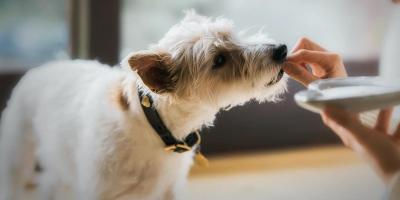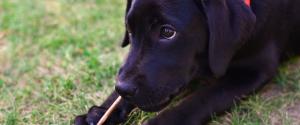
How to Stop Your Puppy From Chewing on Everything

Chewing is a normal behaviour in puppies and adult dogs, but it can wreak havoc on your shoes, books and furniture. Wondering how to stop a puppy from chewing on your belongings? The best thing to do is to direct him to chew on his appropriate toys. If you find that he is chewing when he’s left alone, look into crating your puppy, or speak to a qualified dog trainer or behaviourist, as this can be a sign of separation anxiety or boredom. Check out our article on puppy separation anxiety to learn more.
Why do puppies chew?
Chewing is usually a healthy, normal thing to do when it isn't destructive. Puppies chew for many reasons:
- To release pent-up energy
- Stress
- Teething, which generally occurs between three and six months of age
- Because chewing enjoyable
Keep in mind that some behaviour that looks like chewing or biting is actually exploratory mouthing. Dogs use their mouths to learn more about the objects around them, similar to how humans use their hands to feel. Read our article on how to train your puppy to stop biting to learn more.
How to keep puppies from chewing inappropriately
The best way to correct inappropriate chewing is to buy your puppy appropriate chew toys. When you catch him chewing on something inappropriate:
- Say "no" or "eh" in a low voice. This is a sound similar to a mother’s growl, which your puppy will recognize as a sign of disapproval.
If your puppy stops chewing to look at you, praise him with his preferred chew toy. Do not use old shoes, socks or gloves, because this will train him to chew on your things.
- Enforce appropriate chewing with the following steps:
- Praise your puppy whenever you see him chewing a dog toy. This teaches him that it is not chewing that is wrong - just chewing the wrong things.
- Make sure puppies have chew toys available at all times, especially when teething. Rotate the toys to provide novelty.
- When possible, put items you don't want your puppy to chew away or out of reach. If not possible, keep him out of the area with gates or by closing doors.
- When you aren't home, confine your puppy in a safe area or crate.
- Increase his exercise and his training. Check out our article on how to exercise your puppy to learn more.
Chewing do's and don'ts
- DO provide lots of good, solid dog toys for chewing.
- DO stay calm. If you catch your puppy chewing something other than a dog toy, do as suggested above.
- DON’T blame the puppy - give him toys to chew, reward him for chewing them, and prevent access to other items.
Related articles


